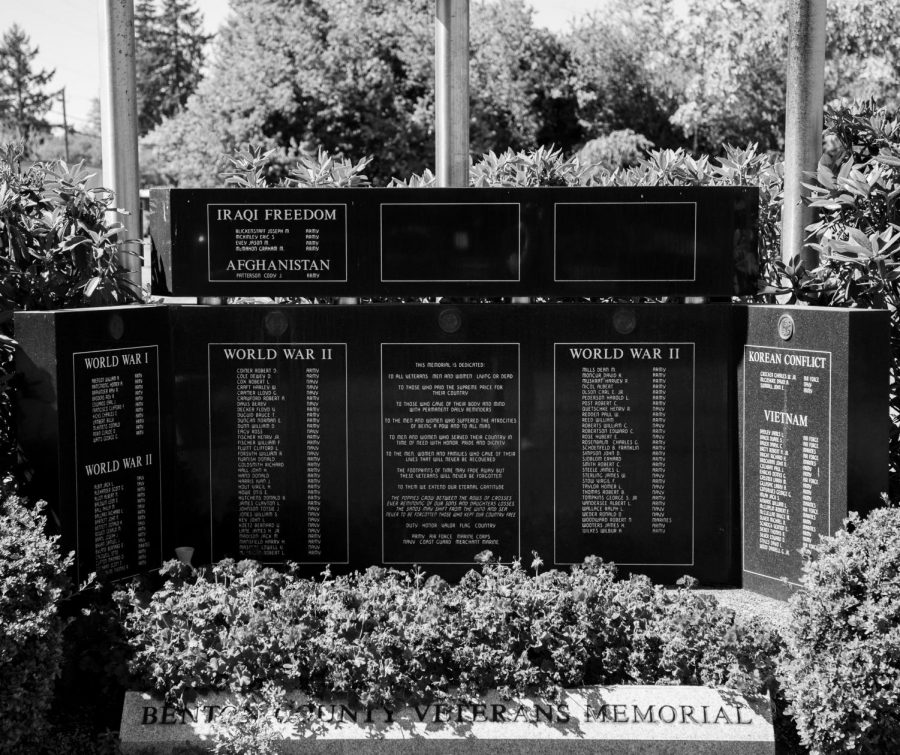Corvallis community reflects on Afghanistan war aftermath
September 20, 2021
Concerned Corvallis, Ore. community members hope the end of the war in Afghanistan will raise public awareness surrounding military sacrifice and global morality.
News stories flooded the media during the mass evacuation of Americans and Afghan refugees at the Hamid Karzai International Airport in Kabul, Afghanistan in late August.
Whether the war in Afghanistan is truly over or not, honoring those who lost their lives and sheltering individuals that escaped is of paramount importance according to numerous members of the Corvallis community.
For some, this is a time for everyone to pay their respects to the fallen soldiers that have sacrificed their lives for this country over the last 20 years of war.
Matthew Edwards, a senior studying political science at Oregon State University, said, “Don’t forget what it costs to have freedom… I know a lot of people in the military community appreciate when the public recognizes what they are doing for them.”
Edwards voiced his concern for the Americans and Afghans left behind at the Kabul airport, saying, “I think we should be doing everything in our power to get people [out] who have American visas and Afghans who are trying to come to [the] US.”
Edwards said he fears for the women and young girls living in Afghanistan who have to go back to living in a brutal way under the Taliban rule.
Hank Norton, one of Corvallis’s concerned residents, submitted a letter to the Albany Democrat-Herald that was that was recently published on their website, titled “Let’s Provide Freedom for Afghans.”
In his letter, Norton said he worries for the safety of refugees after settling in the United States. His call to action is for local community members to deliver refugees their long deserved freedom by uniting as a people.
“Each of us is pretty limited in what we can do individually, but I feel like what we could do collectively is so big,” Norton said. “If we worked together and pooled our resources… [for] a person who only has a little bit to give and a little bit to offer, you have to create some system for them to be able to do that.”
Norton said OSU students likely cannot make big changes as individuals, but if there was a big push from students collectively, they could do a lot to help refugees as long as they organize.
“It’s really easy to turn away and look away from this stuff and not think about it—it’s easy and more comfortable because it’s so depressing and miserable—but we can’t do that,” Norton said. “We try to hide from the horrible reality and chaos around us and we just can’t keep doing that, or it is going to be our downfall. We have to step up and we have to help people and we have to do what is right.”
Norton said students can contact him by email for more information.
For Marine Corps combat veteran Matthew Schatz, who served in the Helmand Province of Afghanistan from 2010 to 2011, there is no greater honor than being able to self-sacrifice for other people.
“It really has to come down to love and empathy for each other,” Schatz said. “And that love and empathy for each other is what allows us to go over there [and] face death in the face—whether you’re going to a post where you might get bombed, or like us, where you’re walking, patrolling eight hours a day.”
Schatz is currently a senior at OSU studying electrical and computer engineering. He wants to raise awareness about the mental health challenges many veterans face amidst the aftermath of war.
“We are no longer like the rest of the world, we are no longer like the people around us,” Schatz said. “We hang around our friends and our family, and we’re disconnected in some way; we’re changed. That’s more of a sacrifice in some way as well, coming home and knowing you’re struggling with mental health but continuing to push on and fight for your family, for your loved ones, and still holding onto that warrior’s ethos, even though there’s no fight to be had anymore… that is the core of our ethics there.”
Finding a support system and being vulnerable about the traumatic events many service members experience can be difficult.
Schatz said he has struggled to open up about his experiences and post-traumatic stress disorder diagnosis but finds himself healing as a student given the resources and people he’s connected with at OSU.
“There’s only one reason I think that I’m still here, and that is because I realized no matter how bad I’m hurting, I still need to allow others into my life in some way,” Schatz said. “It was because of the people at this school, Oregon State University—the instructors I reached out to when I couldn’t breathe, the advisors I reached out to when I couldn’t function, when I couldn’t get up, when I couldn’t fight anymore, I didn’t have anything to fight— who just gave me love and showed me that there is so much more to life, and letting that love into your life fill you and open the soul.”











































































































